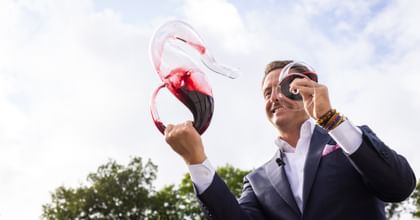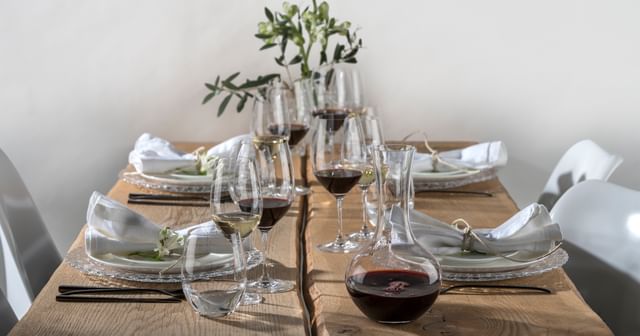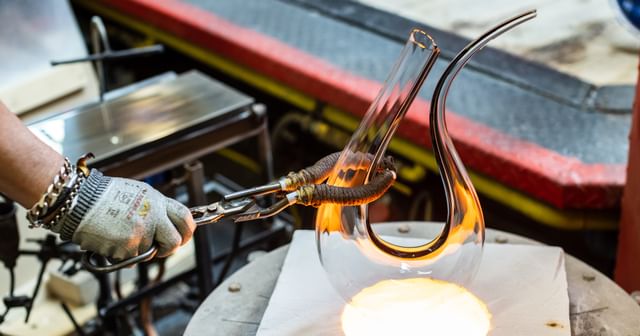Die nächste Stufe des Weingenusses
A Guide to Decanting Wine

Wine connoisseurs, whether professionals or wine lovers, are divided over the process of decanting. When should you decant wine and which wines benefit from it – or is this simply a matter of taste? We believe that wines are still decanted too rarely, and shouldn’t be restricted to red wines. Read on for our guide to decanting wine.
Take wine enjoyment to the next level
Why do we decant wines?
Traditionally, only mature red wines were decanted in order to separate the wine from sediment and to gently aerate the wine after years spent in the bottle. A wine 10 years or older is typically considered as matured.
However young red wines also benefit from decanting, as the aeration makes them smoother and rounder, speeding up the ageing process.
We should decant younger wines (younger than 10 years) to open up aromas and flavours, revealing more complexity. Carbon dioxide is the main preservation element in wine, which is integrated during the first (alcoholic) fermentation. Exposure to oxygen burns off carbon dioxide, effectively maturing the wine and allowing the bouquet to develop faster.

Which wines should be decanted?
Its typically thought that only red wines benefit from decanting, but the rules are based less on colour and more on age and structure. Simply put, any wine that would benefit from ageing can be decanted. That includes red wines, white wines and even champagne. Decanted wine shows more expression on the palate and, in the case of reds, better integrates and smooths out tannins.
How do you decant wines?
Mature wines should be decanted gently with caution. Depending on the age of the wine and how it has been stored, excessive oxidation can strip a mature wine of its remaining character. To decant a mature wine, slowly pour the wine into the decanter without allowing any sediment to leave the bottle. Let the wine to flow smoothly down the walls of the decanter to gradually aerate.
In a younger wine, we recommend the complete opposite, as you want to burn off as much carbon dioxide in the wine as possible. Turn the bottle upside down and let it vigorously splash into the decanter, ideally producing a thick frothy head.

How long should you decant a wine before you drink it?
Unfortunately asking how long you should let your wine breathe is a bit like asking how long a piece of string is. There are a number of varying factors like the style and structure of the wine, but generally speaking, the older the wine, the less time it needs open. You also don’t want to decant wine that you don’t intend to drink, just as you wouldn’t leave a bottle of wine open overnight as it would oxidise.
If possible, decant your mature wines at least an hour before you drink it. Just like decanting an older wine too vigorously can burn off its lighter characters (typically fruit and floral), decanting it too early can do the same.
A young wine will benefit from decanting at least a few hours prior to consumption. However if you are using one of RIEDEL's double decanting pieces, you can decant right before you want to consume it as the piece does all the work – more on this below!
How do you choose the right decanter for you?
Depending on your budget, choose a decanter that fits in your home and doesn’t intimidate you.
It should be easy to use, easy to wash, and easy to take care of. If you use it regularly, it won’t get dusty and dirty; there’s nothing worse than having to clean your decanter every time you get it out because it has dust in it from lack of use. Click here for our comprehensive instructions on how to clean your decanter!
The style of decanter you select primarily depends on what you intend to use it for: young wines, old wines, or both? A decanter with a simple design will be suitable for both young and old wines, but an elaborate piece designed to invigorate young wines is sure to impress your guests when set upon the table.
Classic or inventive, we've got options in every budget so there's a RIEDEL crystal decanter for you.

What makes RIEDEL decanters special?
Our brand philosophy has always evolved around bringing you greater wine enjoyment. From wine to cocktails and everything in between, we’ve spent generations designing intelligent glassware to bring wine lovers a heightened sensory experience with their favourite bottles.
Through this process, we have invented a collection of crystal wine decanters that feature a double aeration function. They actively aerate as you are pouring wine, not only when you first decant the bottle into the piece. For this reason, they are incredibly functional for young wines, as their air pockets create a vacuum that pops oxygen into the wine. Our series of Snake decanters are the perfect instruments for the enjoyment of young wine and add incredible theatre to your dining setting. As with all RIEDEL pieces, they combine spectacular design with excellent functionality, which makes decanting an enjoyable part of the wine experience!
See here to view the full selection of RIEDEL decanters and carafes!
Standorte